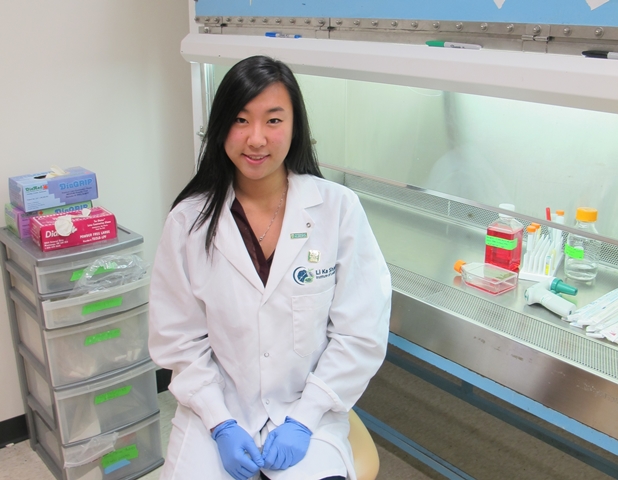
Connie Le
Connie Le was bitten by the research bug early. Her first research experience came in her final year of high school when she had the opportunity to work with Gina Rayat of the Alberta Diabetes Institute at the Faculty of Medicine & Dentistry. Le loved her time in Rayat's lab and began to see the possibilities for creativity, discovery and freedom in a research career. But when she attended her first scientific conference (during her undergraduate summer research program at the University of Toronto in Mississaga with Ulrich Krull) she saw the disconnect between research discoveries and health-care delivery. "Because of that, I became really interested in how to bridge that gap - how do you get these amazing discoveries from basic research labs into clinical settings?"
And then she met faculty member, physician and acclaimed virology researcher Lorne Tyrrell and realized one way that she could help close that divide. "Dr. Tyrrell does research in his lab and then goes back to his patients; he takes what he learns from one area and uses that knowledge in the other setting. His transition from bench to bedside is so organic."
It's a transition that Le hopes to emulate in her own career. She aims to become a clinician scientist, like Tyrrell, who now supervises her graduate research on Hepatitis B. To achieve this goal, she is combining medical school with research through the Faculty's MD/PhD program.
Parallel to her admission to the MD program, the Department of Medical Microbiology and Immunology nominated Le for a Vanier Canada Graduate Scholarship and she is one of the 165 successful Vanier Scholars from across Canada announced recently. The Vanier program is designed to attract and retain world-class doctoral students who demonstrate leadership skills and a high standard of scholarly achievement in doctoral studies. Funding for the Vaniers comes from the three federal research granting agencies - Canadian Institutes of Health Research, Natural Sciences and Engineering Research Council and Social Sciences and Humanities Research Council.
Le points out that Hepatitis B is still a huge problem worldwide despite the existence of a vaccine as well as a treatment that stops replication of the virus. But carriers of the disease must take drugs for the rest of their lives and costs can be prohibitive, particularly in developing countries where the carrier rates are highest.
"So we're going to try to get to the source of the virus," says Le. She explains that Hepatitis B makes a short circular DNA genome of its own and this DNA is very robust and hard to remove. The goal of Le's research is to find a way to destroy that viral DNA. Such a strategy, combined with the current therapy (which lowers the viral concentration and ensures the virus doesn't reproduce), would mean a cure for Hepatitis B. And no more need for expensive lifelong therapy.
Le is exploring a couple of new approaches to destroy the DNA for Hepatitis B. A former graduate student in Tyrell's lab found a way to create something called zinc finger proteins that can bind to Hepatitis B DNA. Le hopes to find a way to send a zinc finger protein into the nucleus of the cell to bind the DNA of the virus. "Then we could tweak it so it pulls the DNA out into the cytoplasm of the cell where the cell could get rid of it through its own mechanisms."
Another idea involves recent research on a natural mechanism used by some bacteria to combat viruses - a type of protein that will destroy specific sequences of DNA. "The idea is to adjust these protein complexes so that they specifically destroy Hepatitis B DNA," she explains. "Then we'll try different ways to get them into cells and see how they work." Le will test both of these ideas and then will work with whichever method looks most promising.
Le is currently in the first year of the medical school portion of her MD/PhD and is a member of the Faculty's 100th medical school class. She will complete two years of the MD program, then go on to her PhD before completing her medical degree. Typically students begin in the MD program then decide whether to pursue the MD/PhD, but receiving the Vanier has encouraged Le to take a slightly unconventional route through the program. "I have always wanted to incorporate research into my career so with the Vanier I thought, 'let's just do this.' The Vanier is an amazing accolade and receiving it is a testament to all those who have supported me and who continue to mentor me."